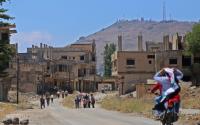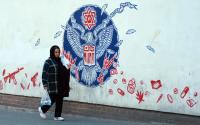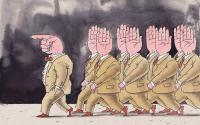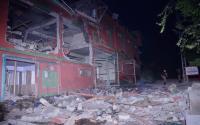Common Dreams / Published on Tuesday, February 14, 2006 by Inter Press Service
Saturday's shooting by Vice President Dick Cheney of a quail-hunting companion on a ranch in Texas is certain to provide talk-show hosts and stand-up comedians with a veritable bonanza of jokes that could last weeks.
And while it makes U.S. history's most powerful Number Two and biggest Iraq war booster a target more of ridicule than fear, the incident and its aftermath are in some ways so characteristic of Cheney's more general modus operandi -- his love of secrecy, his refusal to take responsibility for things that go badly, and his penchant for shooting first and asking questions later -- as to be irresistible to every political wag in Washington and beyond.
Right-wingers, who represent the core of the Cheney's long-declining political constituency, are already cringing, fearful that their hero's misadventure will become the metaphor by which his tenure will be remembered.
On Monday's broadcast of the Tonight Show, comedian-host Jay Leno said in his opening monologue, "Do you know that Dick Cheney tortured the guy for a half-hour before he shot him?"
''Unfortunately, this is very bad news for the White House -- and not just because of the inevitable late-night jokes that will inundate the airwaves over the next week,'' wrote far-right columnist Michelle Malkin.
''The (Democrats) will exploit this accident to smear Cheney as incapable of being trusted, weak of mind, etc. The resignation rumors will fly again,'' she added. ''And the biography of a man who has served this country so well and so honorably for so many years will be overshadowed by a single, ill-fated hunting mishap.''
She may have been thinking of former President Gerald Ford, for whom Cheney served as chief of staff, whose habit of hitting spectators when teeing off at any number of golf courses became a symbol for the stumbling -- albeit good-natured -- ineptitude of his two years in office.
"It's not hard to find Jerry Ford on a golf course,'' comedian Bob Hope once said. ''You just follow the wounded.''
The apparent accident took place late Saturday afternoon at the mega-ranch owned by Katharine Armstrong, a major Republican donor, where Cheney, an avid and experienced bird hunter, had been invited for the weekend.
The victim, Harry Whittington, another Texas Republican heavyweight and Cheney chum, was reportedly walking through tall grass toward Cheney from behind when a nearby quail took flight. The vice president picked out the bird, wheeled his gun around behind him to follow it, and pulled the trigger, striking Whittington with birdshot in the face, neck, and chest.
The 78-year-old Whittington was immediately given attention by the medical staff that travels with Cheney and subsequently taken to a hospital in the Texas city of Corpus Christi, on the Gulf coast, where he spent more than a day in the intensive care unit. His condition was reported by the hospital Monday to be ''very stable.''
But the incident has raised a number of questions, all of them embarrassing to the vice president, to say the least.
First, neither the vice president's office nor the White House informed the press of what had taken place. Rather, it fell to Armstrong to alert the public by calling a local newspaper almost 24 hours after the shooting. When asked about her account on Sunday, the White House simply confirmed that the incident occurred without any elaboration, although on Monday, spokesman Scott McClellan said it had been reported to President George W. Bush late Saturday.
''If Armstrong had not made the call, it is not clear when, if ever, the vice president's office would have told the public about the incident,'' noted Byron York, White House correspondent of the right-wing National Review and a staunch Cheney supporter who wondered what would have happened had Whittington shot Cheney rather than the other way around.
In fact, the Secret Service had informed the local sheriff shortly after the incident, but a deputy who was sent to investigate it that evening was turned back due to a ''misunderstanding'' presumably unrelated to the ''executive privilege'' that Cheney has cited in denying Congressional committees records on secret meetings with oil executives on energy policy or with administration lawyers on redefining torture and the application of the Geneva Conventions.
While another deputy reportedly interviewed Cheney the following morning, any direct evidence that the vice president might, for example, have been under the influence of alcohol, was long gone.
It was determined, however, that he did not have a specific hunting permit for which he is to receive a warning from the Texas Parks and Wildlife Department.
While Cheney predictably stayed out of the media spotlight Monday -- he even left a meeting with Bush and United Nations Secretary General Kofi Annan early so as to avoid a photo-opportunity during which impertinent reporters often lob questions -- his office and the White House, true to past experience, denied that he had done anything wrong.
''Unfortunately these kinds of hunting accidents happen from time to time,'' White House spokesman Scott McClellan told reporters, cautioning them not to second-guess the vice president in much the same terms that he has used when serious mistakes have come to light about the Bush administration's conduct of the global war on terror. ''I think you can always look back at these issues and look at how to do a better job,'' he said.
''[H]e was not careless or incautious or violate any of the [rules],'' insisted Mary Matalin, a top aide to the vice president. ''He didn't do anything he wasn't supposed to do.''
In her call to the Corpus Christie Caller-Times, Armstrong even tried to blame Whittington for the accident because he had allegedly failed to notify the other hunters of his precise location after dropping behind them to retrieve a fallen quail, according to the reporter who interviewed her.
While it is clear that Whittington bore at least some responsibility for not doing so, the overwhelming consensus among hunters Monday was that Cheney had, as Time Magazine reported, ''violated the No. 1 rule of hunting by failing to keep track of his hunting buddies at all times.''
Because the bird's flight path is so unpredictable, ''experts counsel the hunter not to sweep the shotgun around and fire if they don't know what's in the line of fire,'' noted Time.
''We always stress to anybody that before you make any kind of a shot, it's incumbent upon the shooter to assess the situation and make sure it's a safe shot,'' Mark Birkhauser, president-elect of the International Hunter Education Association, told the Associated Press (AP).
That advice probably stands as the ultimate metaphor for what has come to be known about Cheney's role in leading the charge into the Iraq war. Coincidentally, it was just the day before the shooting incident that the journal Foreign Affairs published an account by Paul Pillar, Washington's top Middle East intelligence official from 2000 until last October, that described the administration's failure to heed pre-war assessments.
The article, which echoed the view of a number of retired intelligence analysts, argued that the administration, and particularly Cheney, was so fixated on going to war that it systematically ignored the intelligence community's warnings that many of its pre-war assumptions both about the threat posed by Saddam Hussein and the ease with which the United States could occupy and transform Iraq were wrong.
The administration, according to Pillar, went to war without requesting -- and evidently without being influenced by -- any strategic-level intelligence assessments on any aspect of Iraq'' -- much as Cheney, fixated on that quail, wheel around and fired his shotgun without first assessing the situation and making sure he had a safe shot.
"Once you squeeze that trigger, you can't bring that shot back,'' Birkhauser told AP.






